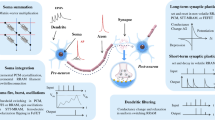
Overview
- This book is open access, which means that you have free and unlimited access
- Presents novel findings relating to neural pathways in various biological systems
- Discusses the latest advances in the fabrication of hybrid bioelectrical interfaces
- Covers research at the intersection of biology, information processing and engineering
Part of the book series: Springer Series on Bio- and Neurosystems (SSBN, volume 16)
Buy print copy
Tax calculation will be finalised at checkout
About this book
Similar content being viewed by others
Keywords
- Open Access
- Neuromorphic Computing
- Self-assembled Networks
- Oscillator Networks
- Simulation of Memristive Devices
- Hippocampal Learning Models
- Artificial Synapse
- Neuronal Synchrony
- Memristive and Memsensor Devices
- Bio-inspired Electronics
- Bio-inspired Decision Making Systems
- Smart Sensor Arrays
- Neuromorphic Sensing
- CRC 1461
Table of contents (17 chapters)
-
Front Matter
Editors and Affiliations
About the editors
Martin Ziegler is a full professor and the Chair of Micro- and Nanoelectronic Systems at the Faculty of Electrical Engineering and Information Technology of the Technische Universität Ilmenau, Germany. He works in the field of neuromorphic engineering. His main research interests concern the transfer of biological learning and memory into electronic systems. For this purpose, he studies and applies memristive materials and devices, micro-electromechanical systems, and neuromorphic circuits.
Thomas Mussenbrock is a full professor and the Chair of Applied Electrodynamics and Plasma Technology in the Faculty of Electrical Engineering and Information Technology at Ruhr University Bochum, Germany. His primary research interests cover modeling and simulation of low-temperature plasmas and plasma processes. Further topics include transport phenomena at the nanoscale and nanoionic devices.
Hermann Kohlstedt isa full professor of Nanoelectronics at Kiel University, Germany. His research concerns the development of novel electronics device and computing primitives based on biological fundamentals. His topics span from thin film analytics, device fabrication and their electrical characterization.
Bibliographic Information
Book Title: Bio-Inspired Information Pathways
Book Subtitle: From Neuroscience to Neurotronics
Editors: Martin Ziegler, Thomas Mussenbrock, Hermann Kohlstedt
Series Title: Springer Series on Bio- and Neurosystems
DOI: https://doi.org/10.1007/978-3-031-36705-2
Publisher: Springer Cham
eBook Packages: Engineering, Engineering (R0)
Copyright Information: The Editor(s) (if applicable) and The Author(s) 2024
Hardcover ISBN: 978-3-031-36704-5Published: 20 September 2023
Softcover ISBN: 978-3-031-36707-6Published: 20 September 2023
eBook ISBN: 978-3-031-36705-2Published: 19 September 2023
Series ISSN: 2520-8535
Series E-ISSN: 2520-8543
Edition Number: 1
Number of Pages: XIII, 433
Number of Illustrations: 39 b/w illustrations, 187 illustrations in colour
Topics: Biomedical Engineering and Bioengineering, Electronics and Microelectronics, Instrumentation, Materials Science, general



